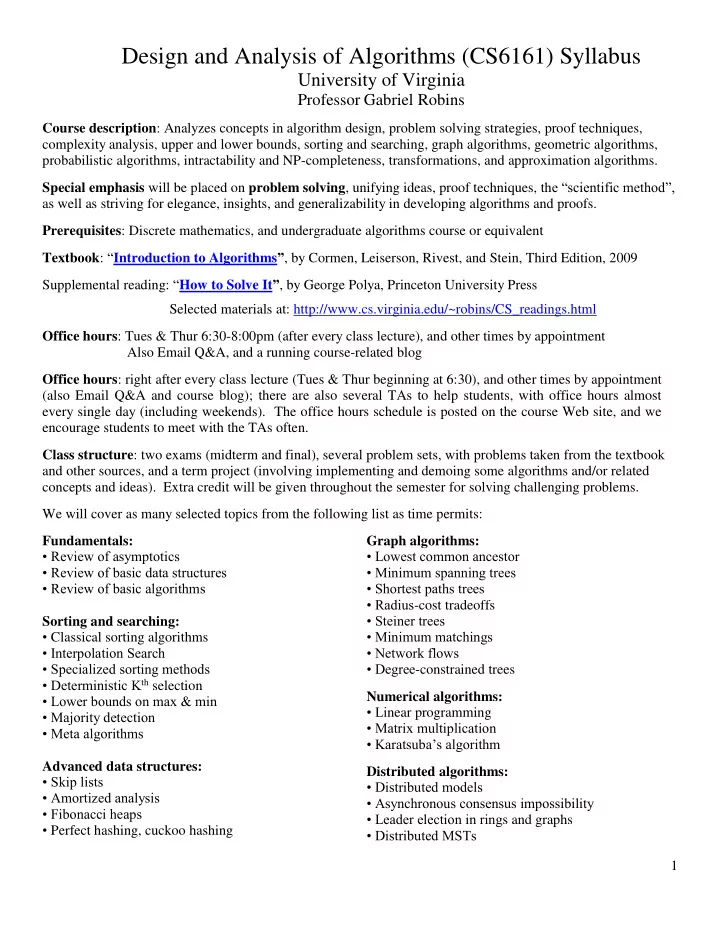

Design and Analysis of Algorithms (CS6161) Syllabus University of Virginia Professor Gabriel Robins Course description : Analyzes concepts in algorithm design, problem solving strategies, proof techniques, complexity analysis, upper and lower bounds, sorting and searching, graph algorithms, geometric algorithms, probabilistic algorithms, intractability and NP-completeness, transformations, and approximation algorithms. Special emphasis will be placed on problem solving , unifying ideas, proof techniques, th e “scientific method”, as well as striving for elegance, insights, and generalizability in developing algorithms and proofs. Prerequisites : Discrete mathematics, and undergraduate algorithms course or equivalent Textbook : “ Introduction to Algorithms ” , by Cormen, Leiserson, Rivest, and Stein, Third Edition, 2009 Supplemental reading: “ How to Solve It ” , by George Polya, Princeton University Press Selected materials at: http://www.cs.virginia.edu/~robins/CS_readings.html Office hours : Tues & Thur 6:30-8:00pm (after every class lecture), and other times by appointment Also Email Q&A, and a running course-related blog Office hours : right after every class lecture (Tues & Thur beginning at 6:30), and other times by appointment (also Email Q&A and course blog); there are also several TAs to help students, with office hours almost every single day (including weekends). The office hours schedule is posted on the course Web site, and we encourage students to meet with the TAs often. Class structure : two exams (midterm and final), several problem sets, with problems taken from the textbook and other sources, and a term project (involving implementing and demoing some algorithms and/or related concepts and ideas). Extra credit will be given throughout the semester for solving challenging problems. We will cover as many selected topics from the following list as time permits: Fundamentals: Graph algorithms: • Review of asymptotics • Lowest common ancestor • Review of basic data structures • Minimum spanning trees • Review of basic algorithms • Shortest paths trees • Radius -cost tradeoffs • Steiner trees Sorting and searching: • Classical sorting algorithms • Minimum matchings • Interpolation Search • Network flows • Specialized sorting methods • Degree -constrained trees • Deterministic K th selection Numerical algorithms: • Lower bounds on max & min • Li near programming • Majority detection • Matrix multiplication • Meta algorithms • Karatsuba’s algorithm Advanced data structures: Distributed algorithms: • Skip lists • Distributed models • Amortized analysis • Asynchronous consensus impossibility • Fibonacci heaps • Leader election in ring s and graphs • Perfect hashing, cuckoo hashing • Distributed MSTs 1
String matching: Computational geometry: • Knuth -Morris-Pratt • Lower bounds • Boyer -Moore • Convex hull algorithms • Edit distance • Segment intersection • Longest increasing subsequence • Planar subdivision search • Smith -Waterman algorithm • Voronoi diagrams • Nearest neighbors NP-completeness: • Geometric minimum spanning trees • Polynomial time and intractability • Delauna y triangulations • Space and time complexity • Minimum density trees • Problem reductions • Minimum bounding box • NP -completeness of satisfiability • Distance between convex polygons • Independent sets • Sm allest Enclosing Circle • Graph colorability • Triangulation of polygons • Travelling salesperson problem • Collinear subsets • Approximation heuristics • Probabilistic analysis Grading scheme : • Attendance 10% (every student is expected to attend all lectures, except for emergencies) • Readings 20% (various readings will be due each week, as explained below) • Midterm 20% (most midterm questions will be minor variations from problem sets) • Final 20% (most final exam questions will be minor variations from problem sets) • Project 30% (implementing and testing a set of algorithms, including a live demo) • Extra credit 10% (EC given for solving additional problems, and for readings) Total: 110% + Weekly readings : The weekly readings in this class consist of a minimum total of 20 items from the recommended readings list at http://www.cs.virginia.edu/~robins/CS_readings.html consisting of various papers, videos, animated demos, Web sites, and books. The required ones are highlighted in red font there, while the rest are "electives". The readings item types constitute a diverse mix of topics, including papers, books, videos, and Web sites. Any items above 20 will count towards extra-credit. The minimum writeup requirements for these readings are a 2 paragraph description for each paper / video / Web site, and 2 page description for books (longer writeups are of course welcomed also). Each writeup should summarize what you learned and what you found interesting / surprising. At least two submissions are due each Monday (by 5pm, beginning the second week of classes), and more than two submission pers week are of course very welcomed and highly recommended (late penalties will be assessed for late submissions). However, no more than two submissions per day will be accepted. This policy is designed to help you avoid "cramming" at the end of the semester, and also to help you retain more of the knowledge by pacing it more evenly over time. Please Email all readings submissions to the class Email account at homework.cs6161@gmail.com Study groups : You are encouraged to work on the problem sets and on the homeworks in study groups (of size no more than six people). These study groups are intended to foster collaborations, encourage brainstorming, create excitement, and make the learning process more fun. Each study group should meet regularly (say twice per week throughout the semester). Everyone in the study group should contribute fairly to the overall group effort. Study groups are not meant for people to just copy solutions verbatim from each other, which is disallowed; it’s OK to share idea s and explanations with each other, and then write your own solutions in your own words, but mass-copying-and- pasting from other people’s work & text is prohi bited. Please form your study groups early in the semester (by the second week of classes) and meet regularly. 2
Recommend
More recommend